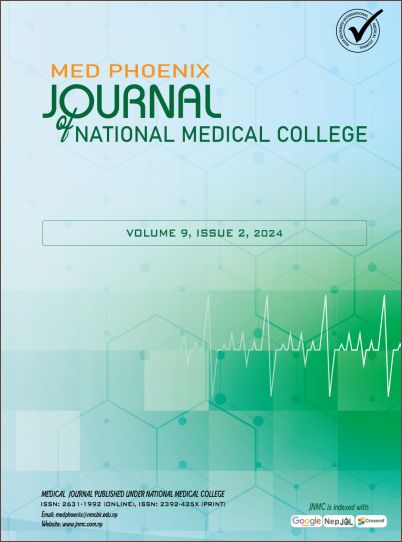Serum Sodium in Acute Stroke and its Clinical Correlation
DOI:
https://doi.org/10.3126/medphoenix.v9i2.73413Keywords:
Acute Stroke, Electrolyte imbalance, Hyponatremia, Modified Rankin Scale (mRS)Abstract
Introduction: Hyponatremia is a frequent electrolyte disturbance in acute stroke, associated with poor clinical outcomes. This study examines the correlation between serum sodium levels and clinical outcomes in acute stroke patients.
Materials and Methods: A cross-sectional study of 100 adult stroke patients confirmed by CT/MRI was conducted at a tertiary care hospital. Demographic and clinical data were collected, with stroke severity assessed using the Glasgow Coma Scale (GCS) and Modified Rankin Scale (mRS). Statistical analysis evaluated the association between serum sodium levels and stroke parameters.
Results: The cohort included 63% males and 37% females, with a mean age of 64 years. Ischemic strokes (58%) were more common than hemorrhagic strokes (41%), and 1% had mixed findings. Right-sided strokes (55%) slightly exceeded left-sided strokes (45%). Dysnatremia was present in 31%, comprising 28% hyponatremia and 3% hypernatremia. Hyponatremia was significantly associated with hypertension (p = 0.010), lower GCS scores (p < 0.001), and worse mRS outcomes (p = 0.005). No significant correlations were found between sodium levels and stroke type (p = 0.241), laterality (p = 0.244), or diabetes (p = 0.246). Middle circulation strokes were the most prevalent (90%), with no sodium-related differences by territory.
Conclusion: Hyponatremia correlates with increased stroke severity and poorer functional outcomes, emphasizing its prognostic value. Its association with hypertension highlights the importance of monitoring sodium levels in hypertensive stroke patients. These findings highlight serum sodium's role in acute stroke management to potentially improve clinical outcomes.
Downloads
Downloads
Published
How to Cite
Issue
Section
License
Copyright (c) 2024 Med Phoenix

This work is licensed under a Creative Commons Attribution-NonCommercial 4.0 International License.
This license enables reusers to distribute, remix, adapt, and build upon the material in any medium or format, so long as attribution is given to the creator.
Copyright on any research article is transferred in full to MED PHOENIX upon publication. The copyright transfer includes the right to reproduce and distribute the article in any form of reproduction (printing, electronic media or any other form).




